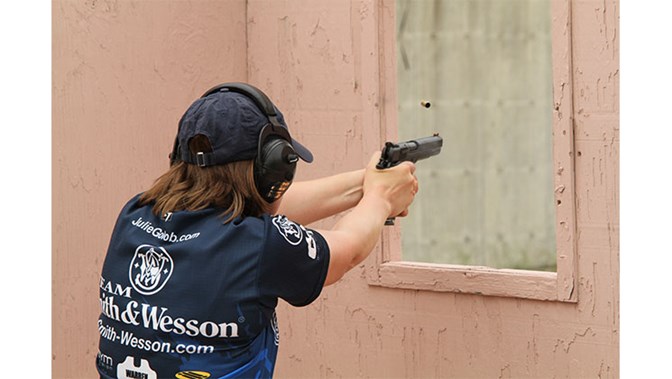
There has long been a school of thought within the shooting community that has held negative views of competition. The “International Practical Shooting Confederation-will-get-you-killed” mantra is well known in certain circles.
As you may imagine, since I’m a competition shooter, I’m not too impressed by the opinions of people who can’t outshoot me. But, I also have a deeper and earlier perspective on the subject of competition.
Before I ever entered an IPSC match, I was a martial artist. I had started with judo in grade school. Then, in high school I somehow took a wrong turn and walked into a wrestling team’s practice session. In my one and only season on the wrestling team, I finished with a trip to the state finals in my weight class—second in the state? I was hooked.
My search for a competition/training lead me to taekwondo. The instructor was an old-school Korean master, Sang Kyu Shim. His idea of training was to practice the correct techniques not until you got it right, but until you couldn’t do it wrong. He also was not at all interested in competition. “You learn the wrong lesson” and “the rules force you to do stupid things.”
As a headstrong young man, I just had to try it. Once I made 1stdegree, I entered a full-contact karate tournament. I was the youngest competitor in the Black Belt division, I was the only 1stdan, and the lightest. The next guy up in weight probably had 30 pounds on me. We wore boxing gloves about the size of pillows. By the time I got to my fourth opponent, word had spread. Spectators were ready for a bloodfest, and the referees were watching me for any infraction.
Basically, I was disqualified from a full-contact karate tournament for “excessive contact.” It was probably the foot sweep-to-elbow-to-the-face combo that did it, but the referee had been moving in several seconds before that. When I was next at class, Mr. Shim called me into his office. “So, what did you learn?” Looking back, I’m sure that one of the other instructors in town had phoned him, wanting to know why I had practically decapitated one of his senior instructors. “Well, you were right, the rules make you fight a certain way. But the rules didn’t forbid an elbow strike.”
At this point, some tacti-cool “operator” is going to point out “IPSC makes you follow rules”—which is correct. But, you see, there are rules in a shootout. They are called state law. Break the rules and you will go to prison regardless of how righteous your defense was.
“But, but, there are tactical rules.” Yes, there are. Sometimes cover matters. Sometimes it doesn’t. Sometimes a speed reload is stupid, and sometimes it is necessary. But what competition does for you is it puts you under stress. Whatever skills you have learned—or want to test or reinforce—they will be tested. If something goes wrong with your game plan, your ability to figure it out, ad-lib, and adapt will be tested. But the gear is all ‘rooney’ (unrealistic for real-world) gear meant for matches. That’s their gear. You get to decide what gear you use. So, here are the rules for those who want to use competition to improve their real-world skills:
You decide what gear you use. If it is your daily carry gun, concealed in your every-day carry holster, then use it in competition. The match organizers will tell you what competitive division your gun fits in.
- You decide how you will approach the stage. You don’t want to stand in the middle of the wide-open window, and hose the targets? Then don’t. “Pie” the room, the window, and the target array.
- You decide shooting order. If you really feel you have more than two targets, you go by “boarding house rules.” (Everybody gets one before anyone gets seconds, then do it.)
- Not interested in lightly-loaded ammo that just makes the required power factor? Then shoot what you want. If your idea of “proper” 9mm ammo is a 124 grain bullet at (one hopes safe pressure) 1200 fps, then do it. If you are going to carry ammo like that, do you really care about shooting a 149 PF load, compared to everyone else’s 125 PF?
- Control your ego. You cannot both shoot to win a competition and be tactically sound no matter how you define the latter. If you are shooting by your definition of “tactical,” then you should be happy you are performing at your best. If your score places you solidly in the middle of a “B” class you should not be concerned. Have the courage of your convictions.
- Stop complaining. If you go to an IPSC/United States Practical Shooting Associationmatch and find what you consider unrealistic stages, stop carping about it. It may be that the club can’t do the “realistic” things you want to do. The range crew may be on the verge of burnout having built and run 100 stages in the three years, with the same props, steel and ranges to work with. Volunteer to design, build and run a stage, and see how things are on that side of the fence.
Mr. Shim was happy I had learned my lesson. Actually, I had learned more, I learned there was no situation without rules. The rules changed, from time and place, and predicament, but there were always rules. There were rules in our own training because we didn’t want to hurt each other. Even when there really were no rules, there would be moral precepts. The prisons are full of people who thought there were no rules, or that they didn’t have to worry about rules because they wouldn’t get caught, or other things were more important.
Know the rules. Knowledge can save your life, your freedom and your soul.


































